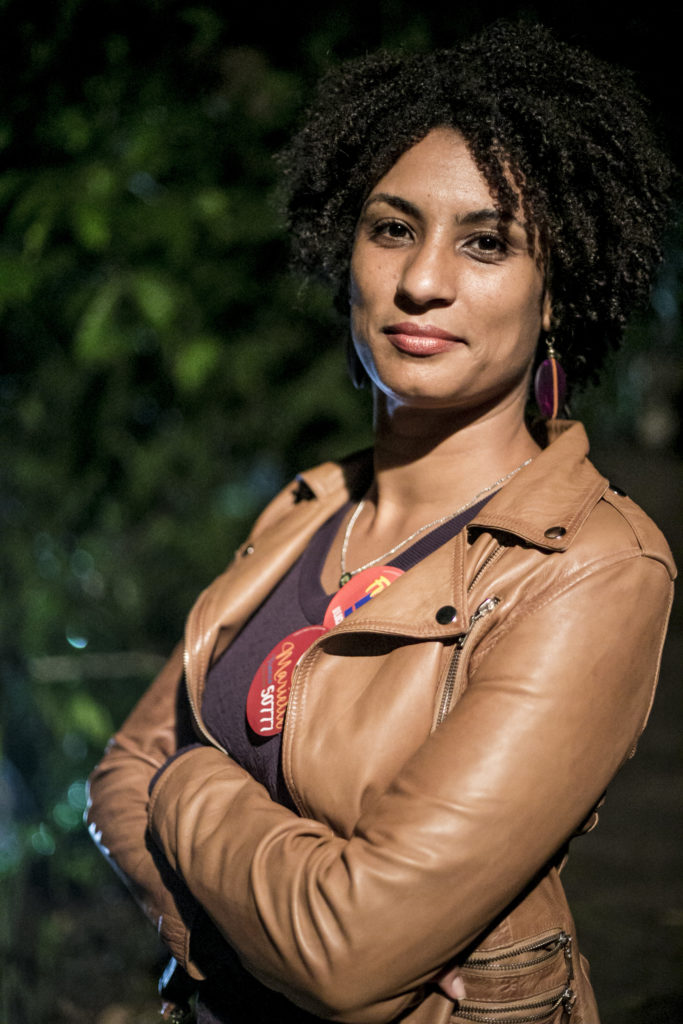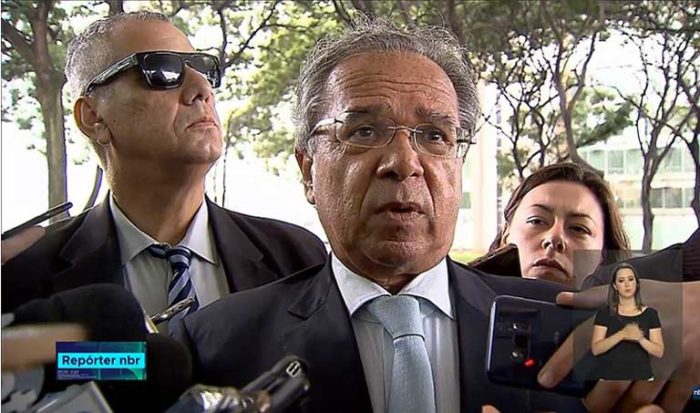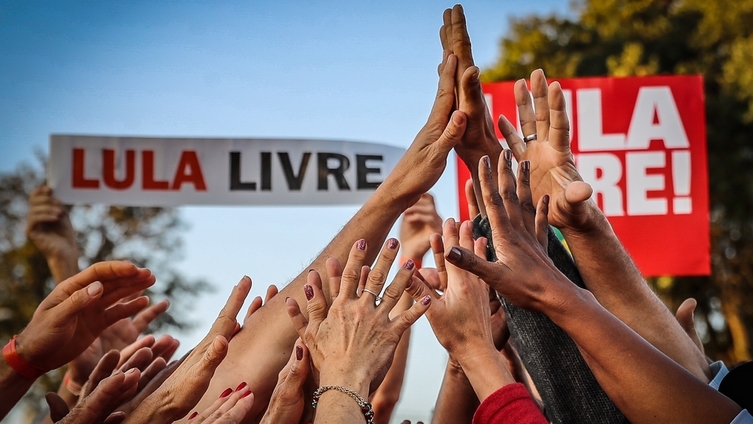São Paulo, November 10 2019. Following a controversial Supreme Court ruling, Lula has been temporarily freed after 580 days in prison on a corruption charge he has always denied. His freedom came, not because of the leaked conversations that revealed a conspiracy between local judge, now Justice Minister, Sergio Moro and the prosecutors to stop Lula running in the 2018 elections, but because the Supreme justices decided that accused persons, even when found guilty in lower courts, can only be imprisoned after all appeals, right up to the Supreme itself, have been heard.
The judges had come under intense pressure from right-wing groups, including full page adverts in newspapers, against this decision, and the final result was close, six to five. But the decision gave Lula, and potentially nearly 5,000 other prisoners, the right to walk free, at least until all appeals against sentences are rejected.
Lula immediately plunged back into the political arena, with fiery speeches to the huge crowds of supporters who gathered to welcome him outside Federal Police HQ in Curitiba, and the next day at the São Bernardo trade union HQ where he was carried aloft through a deliriously cheering multitude.
After 10 months of unrelenting attacks by Bolsonaro against the PT governments and Lula himself, as the president set about dismantling the social and environmental policies of his predecessors, it was refreshing to see a counter-attack galvanising the opposition, which has often seemed intimidated by the avalanche of fake news and virulent verbal abuse. Lula did not pull his punches, attacking Bolsonaro, Sergio Moro, the Lavajato prosecutors, and the federal police. He accused Bolsonaro of being president of the militias.
The ghost of Marielle

The links between the Bolsonaro family and one of the Rio militias have become more and more apparent. At the same time, the militia’s involvement in the murder of Marielle Franco, the Rio councillor assassinated on 14 March 2018, has been confirmed. Flavio Bolsonaro, when a Rio state deputy, awarded decorations to military policemen who were known to be members of the Escritório do Crime militia. Fabricio Queiroz, an ex-policeman who worked for the family and was involved in dubious deals has been shown to be connected to the same militia. And Ronnie Lessa, the ex-policeman and militia member accused of firing the shots that killed Marielle and her driver Anderson Gomes, lives just a few houses away from Bolsonaro in the same Barra da Tijuca gated community.
‘Seu Jair’
That geographical connection was the subject of a bombshell statement by the security guard at the gated community to the police a few days ago. He said that a few hours before the murder of Marielle on March 14 2018, a man called Élcio Queiroz arrived and said he was going to Bolsonaro’s house, No. 58. Élcio, no relation to Bolsonaro family fixer Fabricio Queiroz, is the man now accused of being the driver for the killer of Marielle.
The guard phoned 58 and ‘seu Jair’ or ‘Mr Jair’ authorised his entry. But, following his car on closed circuit TV, the guard saw that instead of going to No 58, he drove instead to No 66, the home of Ronnie Lessa. The diligent guard said he then phoned No 58 again to tell him this, but ‘Seu Jair’ said it was alright, he knew. The guard noted details of the visitor, his car and where he was going, in the guardhouse register.
But that same day Jair Bolsonaro was in congress in Brasilia voting on two bills and appearing in videos. Could he have got home in time to answer the call from the gate? Or was the guard, as the prosecutors involved in the case, claim, lying? If so, why?
After all, the guard did not know that Marielle was about to be murdered. And he had no way of knowing that 7 months later, Jair Bolsonaro would become president. Did he call on the landline or on Bolsonaro’s mobile, which would have enabled the congressman to answer it in Brasilia?
TV Globo’s programme ‘Jornal Nacional’ revealed the guard’s testimony, devoting several minutes to it, showing the written annotations in the register. They also pointed out that Bolsonaro was in Brasilia that day.
A rant from Riad
As these revelations were made public, the President was on an official visit to Saudi Arabia, and it was the middle of the night in Riad. Nevertheless, he immediately took to the airwaves with a 23 minute long aggressive rant, directly addressing ‘you at Globo’, accusing them of being scoundrels and pigs, and trying to overthrow him. He made a barely veiled threat not to renew their licence in 2021. The image of Bolsonaro beside himself, apopletic, shaking his finger at the screen, was eerily reminiscent of Adolf Hitler, even down to the lock of hair falling on his forehead.
Besides Globo, the president also accused Rio governor Wilson Witzel of leaking details of the porter’s testimony to Globo as part of a plot to destroy him, because he, Witzel, plans to run for president in 2020. For good measure and without any evidence, Bolsonaro accused the police inspector in charge of the case of conspiring with the governor.
Yet the same inspector has now been accused by the federal police of taking a huge bribe to sabotage the investigation into Marielle’s assassination!
With so many questions swirling around the investigation, one important fact seems clear: Bolsonaro and at least one of his sons, Flavio, had links to the militia and direct or indirect relations with the murderers of Marielle.
Keep him cornered
The central idea is to keep Bolsonaro cornered, weakened, but in power, with Paulo Guedes and his reforms as the anchor of the government.
This is the theory of journalist Luis Nassif. Ignoring what is happening in Chile, Guedes wants to introduce the same failed neoliberal model here, dismembering the social network built up since the return to democracy in 1985.

Rodrigo Maia, speaker of the congress, has indicated that many parts of the reforms will be opposed. Lula will now travel up and down Brazil as effective leader of the opposition, denouncing the reforms that will dismantle rights and protections.
The Bolsonaro government’s answer to what they brand the radicalization of the left, has been to test the waters for an authoritarian response. In the next few months, nobody knows which part of the Chilean situation Brazil will be copying – the model that has led to social revolt, or the revolt against those attempting to impose it.

